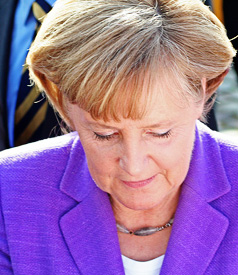The political motives behind German Chancellor Angela Merkel’s decision to present a Press Freedom Award to Kurt Westergaard – the Danish cartoonist whose drawing of the Prophet Mohammed ignited violence around the world – are hard to discern. The global coverage this cartoon received was blown grossly out of proportion given the actual value of the news story. The graphic depiction of the Prophet in Westergaard’s cartoon has never bothered me – I shrug simply because it is a bad drawing.
Thanks to media attention, however, it was enough of an accelerant to give Islamists the necessary fire to promote their jihadi mindsets. Whether or not Merkel’s intentions ever become clear, her actions still highlight that it is not enough to simply stand by and wait until the media frenzy around an inflammatory issue such as Westergaard’s Prophet drawings dies down. As long as an artist can gain enough notoriety to receive a national prize five years after the publication of what was arguably at most a mildly inflammatory work, it remains clear that a deeper shift must take place among citizens, and in this case, perhaps especially above Muslims.
Before it was vogue to report on such things, I drew a cartoon of a Muslim cleric as an ape attempting to read an upside-down Koran. I never landed an interview with CNN, nor did I win any international accolades for the cartoon. I did, however, receive the requisite threats from numerous jihadists promising earthly retribution for drawing a hairy simian turning the pages of the Koran. The message in my cartoon is unequivocal – there is nothing wrong with individual faith, but there is a problem with clerics who aggrandize themselves as Islam’s gatekeepers.
Islamists have always used out-of-context Koranic verses to their advantage; more recently, they have adapted to the information age, adeptly wielding news bytes like salafi swords. They have managed to channel a flood of disparate and confusing stories into a single narrative of hate and violence.
Take for example the aftermath of a speech Merkel gave in Potsdam, in which she said, “It is irrelevant whether Westergaard’s caricatures are tasteless or not, whether he thinks they are necessary or helpful, or not. Is he allowed to do that? Yes, he can.” She also criticized as “abhorrent” pastor Terry Jones’ then-plan to mark the anniversary of the 9/11 attacks by burning Korans. Merkel’s statement led to a response, thousands of kilometers away, by a professor at the Al-Azhar Seminary in Cairo. An Egyptian professor told a daily newspaper that Merkel reflects a “two-faced” European approach to Muslims – condemning the burning of Korans on one hand, but praising Westergaard on the other. A day later, Reuters announced that Danish police had arrested a Somali man in connection with an accidental explosion at a Copenhagen hotel. The perpetrator was allegedly preparing an attack on Jyllands-Posten, the Danish newspaper that originally published the controversial Prophet cartoons. Finally, just days ago, Muhammad Mukhtar, a candidate for the Afghan Parliament, ranted, “It is the duty of Muslims to react … I think the first and foremost reaction should be that wherever Americans are seen, they be killed. No matter where they will be in the world they will be killed.”
Muslims must not forget that the same constitutional rights that allow a Muslim community center to be built at a now-contentious site near ground zero in Manhattan also allow Westergaard to draw his cartoons and pastor Jones to burn copies of the Koran. The US Supreme Court’s message is unmistakable when it says that the government cannot suppress speech even when it is deemed to be offensive to a majority of the people. Provocative acts like Westergaard’s and Jones’ – and the media coverage that amplifies them – are not going anywhere. If the silent Muslim majority truly wants peace, it is incumbent on them to confront the hijackers of their faith, to marginalize and eradicate Islamists who propagate hate.
Secretary of State Hillary Clinton said last week, “It is regrettable that a pastor in Gainesville, Florida, with a church of no more than 50 people can make this outrageous and distrustful, disgraceful plan and get the world’s attention, but that’s the world we live in right now.” She might as well have been speaking to the silent Muslim majority – just change “pastor” to “imam” and “church” to “mosque.” Muslims must take a good, long, look at themselves. Only then will the doodles of a third-rate Danish cartoonist and the antics of a pistol-toting pastor be made irrelevant. Picture the day when none of these sideshows makes the news because they warrant no reaction from the greater Muslim community.
Join us in defending the truth before it’s too late
The future of independent journalism is uncertain, and the consequences of losing it are too grave to ignore. To ensure Truthout remains safe, strong, and free, we need to raise $50,000 in the next 10 days. Every dollar raised goes directly toward the costs of producing news you can trust.
Please give what you can — because by supporting us with a tax-deductible donation, you’re not just preserving a source of news, you’re helping to safeguard what’s left of our democracy.
